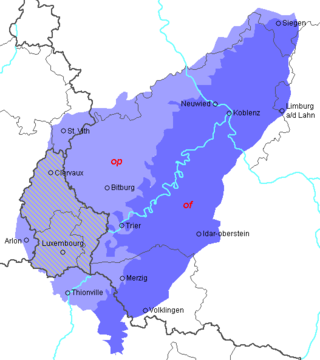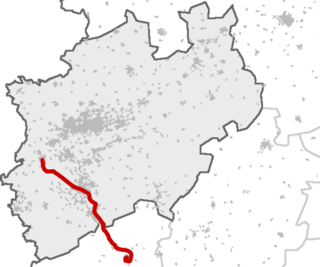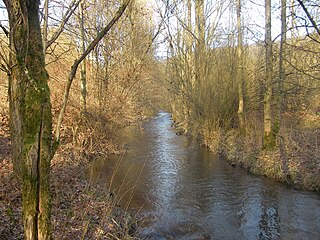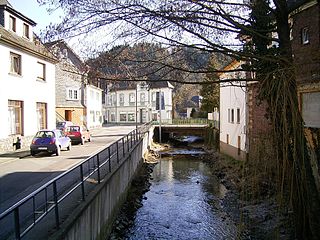
North Rhine-Westphalia or North-Rhine/Westphalia, commonly shortened to NRW, is a state (Land) in Western Germany. With more than 18 million inhabitants, it is the most populous state in Germany. Apart from the city-states, it is also the most densely populated state in Germany. Covering an area of 34,084 square kilometres (13,160 sq mi), it is the fourth-largest German state by size.

The Rhineland is a loosely defined area of Western Germany along the Rhine, chiefly its middle section.

The Moselle is a river that rises in the Vosges mountains and flows through north-eastern France and Luxembourg to western Germany. It is a left bank tributary of the Rhine, which it joins at Koblenz. A small part of Belgium is in its basin as it includes the Sauer and the Our.

The Sieg is a river in North Rhine-Westphalia and Rhineland-Palatinate, Germany. It is a right tributary of the Rhine.
Vulkaneifel is a district (Kreis) in the northwest of the state Rhineland-Palatinate, Germany. It is the least densely populated district in the state and the fourth most sparsely populated district in Germany. The administrative centre of the district is in Daun. Neighboring districts are Euskirchen, Ahrweiler, Mayen-Koblenz, Cochem-Zell, Bernkastel-Wittlich, and Bitburg-Prüm.

Ahr is a river in Germany, a left tributary of the Rhine. Its source is at an elevation of approximately 470 metres (1,540 ft) above sea level in Blankenheim in the Eifel, in the cellar of a timber-frame house near the castle of Blankenheim. After 18 kilometres (11 mi) it crosses from North Rhine-Westphalia into Rhineland-Palatinate.

The Heller is a 30 km long river in western Germany. It is a left tributary of the Sieg. The source is located near Haiger in Hesse. It flows through Burbach and Neunkirchen in North Rhine-Westphalia. It flows into the river Sieg in Betzdorf, Rhineland-Palatinate. Its basin area is 204 km².

Moselle Franconian is a West Central German language, part of the Central Franconian languages area, that includes Luxembourgish. It is spoken in the southern Rhineland and along the course of the Moselle, in the Siegerland of North Rhine-Westphalia, throughout western Rhineland-Palatinate and Saarland, Luxembourg, the south of the German-speaking Community of Belgium and in the neighboring French département of Moselle. The Transylvanian Saxon dialect spoken in the Transylvania region of Romania is derived from this dialect as a result of the emigration of numerous "Transylvanian Saxons" between 1100 and 1300, primarily from areas in which the Moselle Franconian dialect was then spoken. Another variety of Moselle Franconian, the Hunsrik, is spoken in some rural areas of southern Brazil, brought by 19th century immigrants from the Hunsrück region in modern Germany.

The Wasserschutzpolizei is the river police that patrols the waterways, lakes and harbours of Germany around the clock. The WSP are part of the Landespolizei. The Federal Police maintains 16 patrol craft and helicopters are part of the Coast Guard (Küstenwache) and assigned to coastal BPOL stations. The watercraft include six offshore patrol vessels, e.g. those of the Bad Bramstedt class, as well as a number of fast inshore vessels and one tugboat.

The Swist is a stream, 43.6 kilometres (27.1 mi) long, in the German Rhineland. It rises on the northern edge of the Eifel at 330 metres above sea level and empties from the right and southeast into the Rhine tributary, the Erft, between Weilerswist and Bliesheim. Occasionally the Swist is also called the Swistbach, and locals often just call it der Bach.

The Rhein-Erft-Express is a Regional-Express service in the German states of North Rhine-Westphalia and Rhineland-Palatinate. It is numbered as line RE 8 and connects the cities of Mönchengladbach, Cologne, Bonn and Koblenz with each other and their surroundings, running hourly. It is complemented by a Regionalbahn stopping service, the Rhein-Erft-Bahn, running also between Mönchengladbach Hauptbahnhof and Koblenz Hauptbahnhof. On weekends it stops at some additional stations between Cologne Hbf and Koblenz Hbf. It is operated by DB Regio with Alstom Coradia Continental EMUs.

The Armuthsbach is an 18.4-kilometre-long, orographically left-hand tributary of the Ahr in the German states of North Rhine-Westphalia and Rhineland-Palatinate.

Asdorf is a river of North Rhine-Westphalia and Rhineland-Palatinate, Germany. It flows into the Sieg in Kirchen.
Holperbach is a river of North Rhine-Westphalia and Rhineland-Palatinate, Germany. It flows into the Sieg near Wissen.
Gosenbach is a small river of North Rhine-Westphalia and Rhineland-Palatinate, Germany. It flows into the Sieg near Mudersbach.
Irserbach is a river of Rhineland-Palatinate and North Rhine-Westphalia, Germany. It flows into the Sieg near Windeck.
Schinderbach is a small river of Rhineland-Palatinate and North Rhine-Westphalia, Germany. It flows into the Gosenbach near Siegen.

Wisser Bach is a river of North Rhine-Westphalia and Rhineland-Palatinate, Germany. It flows into the Sieg in Wissen.
Langbach is a small river of North Rhine-Westphalia and Rhineland-Palatinate, Germany. It is a right tributary of the Kyll near Frauenkron.














